In this article:
Turmeric is a common household spice that is part of different cuisines. It is also used as a dyeing agent. Moreover, turmeric plays a major role in ancient Indian and Chinese medicinal systems, often used in the treatment of liver problems, digestive issues, and wounds.
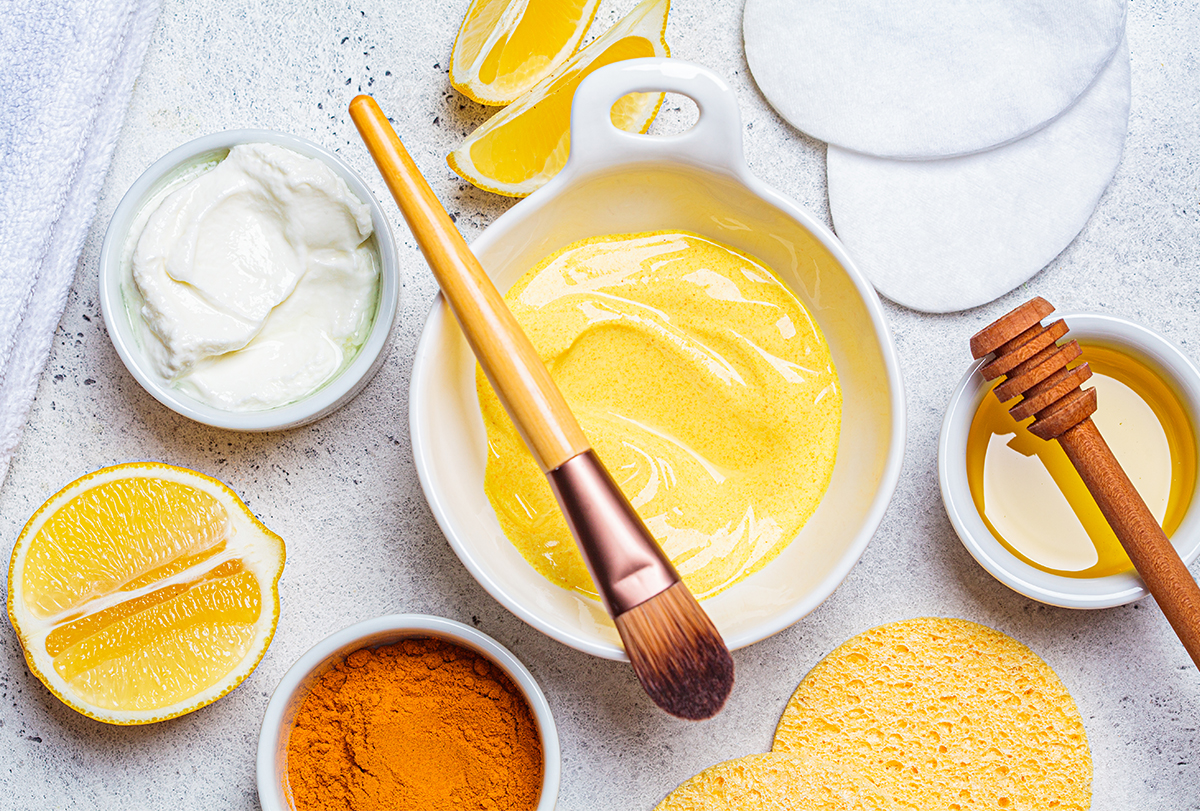
Turmeric has been shown to improve chronic inflammation, (1) Alzheimer’s disease, (2) and heart disease. It acts against free radicals in the body and boosts the body’s natural antioxidants.
Curcumin, the primary active compound in turmeric, can help lower the risk of brain diseases. It also finds wide application in skin care and treatment.
Research has shown that the anti-inflammatory and antioxidant nature of turmeric can help improve pigmentation, stretch marks, psoriasis, acne scars, premature aging, and sun damage, among other cosmetic issues. (3) Therefore, adding turmeric to your skin care routine can greatly benefit your skin, giving it an even tone and a fresh glow.
Benefits of Turmeric on Skin
Here are some of the skin benefits of turmeric.
1. Treats acne
Acne is a highly prevalent skin problem that requires proper care and treatment to prevent it from worsening.
Multiple anti-acne products are available on the market, but their chemical composition may cause inflammation or irritation, especially in sensitive skin. Therefore, it is best to use natural products that are gentle on your skin. One such natural ingredient is turmeric.
Turmeric is an anti-inflammatory and antiseptic agent that helps reduce the swelling and redness associated with acne. It also limits the growth of acne-causing bacteria and thus prevents the spread of acne. (4)
How to use:
- Mix honey and turmeric. Apply the paste to the affected areas, and allow it to dry overnight. Wash the paste off with cold water in the morning. Repeat this remedy daily.
- Mix ½ tsp of turmeric with 2 tsp of sandalwood powder. Add some milk to form a paste, and apply it to the face. Wash it off with lukewarm water once dry. Use this remedy two to three times a week.
- Mix turmeric with apple cider vinegar (ACV), and use the paste as a spot treatment. However, limit its use as ACV is an astringent, and similar to a toner, it can tighten the skin.
2. Fights signs of aging
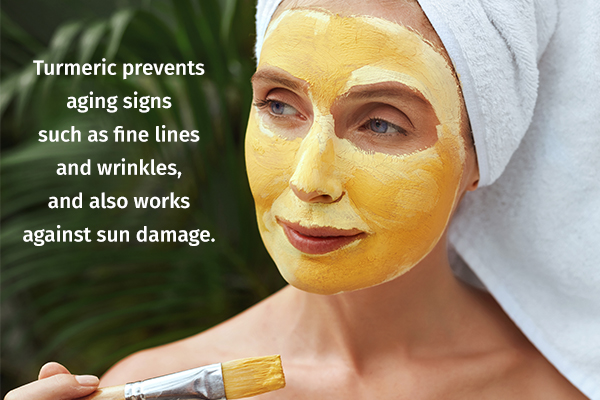
As mentioned above, the curcumin present in turmeric is a potent antioxidant that helps control the production of free radicals in the body. This, in turn, prevents the signs of aging, such as fine lines and wrinkles, and also works against sun damage. (5)(6)
How to use:
- Mix 1 tsp of turmeric powder with 1 tsp of honey and 1 tsp of milk.
- Cleanse your face, and apply a thin layer of the turmeric paste.
- Wash your face after 15 minutes with cold water and pat it dry.
ALSO READ: Signs of Skin Aging and How to Fix Them
3. Facilitates scar and wound healing
Turmeric has anti-inflammatory properties that soothe the skin by acting on the pores. This spice is also useful in fading scars and healing wounds, owing to its antiseptic nature. (7) It is thought to work by stimulating collagen production and limiting the effect of reactive oxygen species or free radicals. (8)
Research has shown that the use of turmeric cream promotes quick healing and helps prevent wound-associated complications in cesarean section operations. (9)
How to use:
- Mix some turmeric with 1 tsp of gram flour, and apply the paste to the affected areas. Allow the paste to dry for 25 minutes, and then wash it off with lukewarm water.
- Mix turmeric powder with milk to form a paste, and apply it over the wound and scars. Wash the areas once the paste is completely dry. Repeat this remedy daily to help improve the appearance of your scars.
4. Relieves eczema
Eczema is an inflammatory skin problem that manifests as red, dry, itchy skin. The curcumin in turmeric possesses anti-inflammatory properties that can relieve eczema-related itching and inflammation.
Moreover, the antimicrobial effects of turmeric act on eczema-causing bacteria, thus treating the skin problem. The topical application of turmeric also boosts skin cell regeneration.
How to use:
- Mix ½ tsp of turmeric powder with some milk to form a paste. Apply the paste to the affected area, and wash it off once dry. Repeat this remedy twice a day.
- Make a turmeric paste using coconut oil and apply it to your skin. Rinse after 15 minutes. Use this remedy three to four times daily.
5. Controls skin oiliness
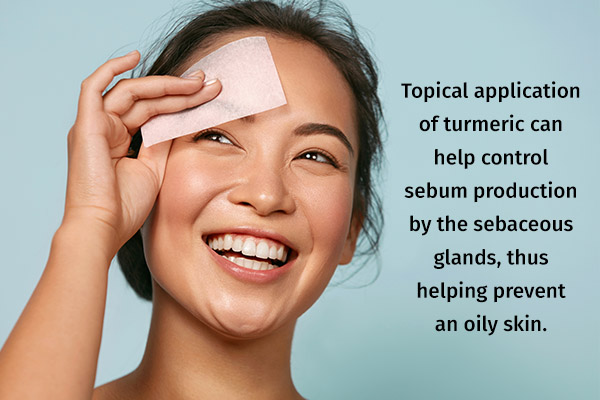
The topical application of turmeric can also help control sebum production by the sebaceous glands, thus preventing oily skin. (10) The antibacterial properties of turmeric can also help clear your skin.
How to use:
- Mix 1–2 tbsp of sandalwood powder with a pinch of ground turmeric. Add 3 tbsp of orange juice to it to form a paste. Apply the paste to your face, and allow it to dry for 10–15 minutes. Wash the paste off using lukewarm water.
- Mix half ½ tsp of turmeric powder with 1 tbsp of gram flour. Mix in rose water to form a paste, and apply it to your face. Once dry, wash it off with lukewarm water. Use this remedy two to three times a week.
6. Reduces body and facial hair
Applying turmeric to body and facial hair can help thin it out and loosen it over time. The hair falls out on its own, lowering the need to tweeze. While turmeric use is a pain-free, gentle, and natural way to help remove hair, its effects take time to show and the results are not immediate.
One study showed that the use of curcuma oil, which is derived from the turmeric family, helped lower hair growth in the underarm area when used for 10 weeks regularly. (11) Turmeric application helps improve your skin health and overall appearance as well.
How to use:
- Mix turmeric with milk and oats to form a thick paste.
- Apply the paste over your face and other body parts.
- Use a damp washcloth to wipe the paste off after 2 minutes. Avoid keeping the paste on for longer as turmeric can easily stain the skin yellow when used in high concentrations.
- Repeat this remedy thrice every week for results.
7. Improves psoriasis
Psoriasis refers to an autoimmune inflammatory skin condition, which causes small, scaly patches to form on the skin. These patches are a result of cell buildup and are often prone to bleeding and cracking.
The anti-inflammatory nature of curcumin can help control the inflammation associated with psoriasis. It also helps limit cell production, thereby reducing the frequency of the patches.
A study found that both topical and oral curcumin preparations are effective in managing the symptoms of plaque psoriasis within 3–8 weeks of use. (12)
How to use:
- Mix turmeric powder and water in a 1:2 ratio in a saucepan and heat it. Simmer until the mixture turns into a thick paste and then allow to cool. Apply the paste to the affected area and cover with gauze. Leave it on overnight. Wash the paste off with water in the morning.
- Consume turmeric tea, which is made by boiling 1 tsp of ground turmeric in 4 cups of water, followed by simmering it for 10 minutes. You can add lemon or honey to the tea to improve its taste.
Note: Since this medical condition can be bothersome, it is best to consult a doctor before trying any home remedy for psoriasis.
8. Treats cracked heels and dry skin
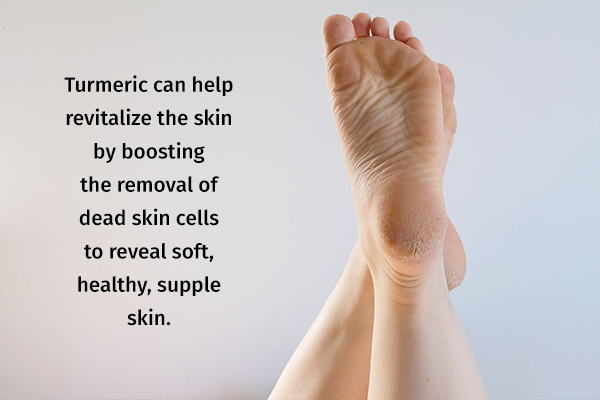
Turmeric is an excellent skin-hydrating agent that can improve skin dryness. It can also revitalize the skin by boosting the removal of dead skin cells to reveal soft, healthy, supple skin.
Turmeric also improves the skin by promoting skin healing and preventing further damage. Therefore, the application of turmeric to the heels can help soften them and reduce the cracks.
How to use:
- Mix turmeric with fresh aloe vera gel, and apply the paste to dry skin.
- For cracked heels, dilute a few drops of turmeric oil with 2 tbsp of coconut oil or castor oil. Massage the oil blend on the cracked heels and leave it overnight.
- Consume turmeric tea or use turmeric as a spice in your daily diet to help hydrate your skin from within.
9. Improves sun damage and wrinkles
Exposure to the sun’s UV rays can damage your skin to a great extent by generating free radicals, often causing sunburn, fine lines, wrinkles, hyperpigmentation, and skin cancer.
The antioxidant nature of turmeric helps combat these free radicals, thus preserving your skin’s elasticity. Moreover, turmeric helps prevent the action of elastase enzyme, which acts on elastin, a protein that gives your skin structure and flexibility, thus preventing wrinkle formation. (13)
How to use:
- Mix 4 tbsp of aloe vera gel with 1 tsp argan oil. Add in 10 drops of turmeric essential oil. Apply the mixture to your face at bedtime, and wash your face in the morning.
- Mix 1 tsp of turmeric powder with 1 tbsp of tomato puree and 1 tbsp of yogurt. Apply the paste to sun-tanned skin and allow it to dry. Wash it off with water. Use this remedy two to three a week to notice results.
10. Soothes burns
Skin burns are often associated with inflammation and pain due to the action of inflammatory mediators. Curcumin can block the action of these inflammatory mediators and improve the symptoms. (14)
Turmeric also acts as an antimicrobial and antiseptic agent to prevent infections or sepsis in burn wounds. A study demonstrated that topical curcumin is effective in the healing of burn wounds. (15)
How to use:
- Mix one pinch of turmeric with cold curd or milk. Apply the mixture to the burn and allow it to dry. Wash the area gently. Repeat this remedy a few times a day for up to 2 weeks or until the burn mark starts fading.
- Add turmeric milk or tea to your diet to facilitate quick healing.
Important Tips
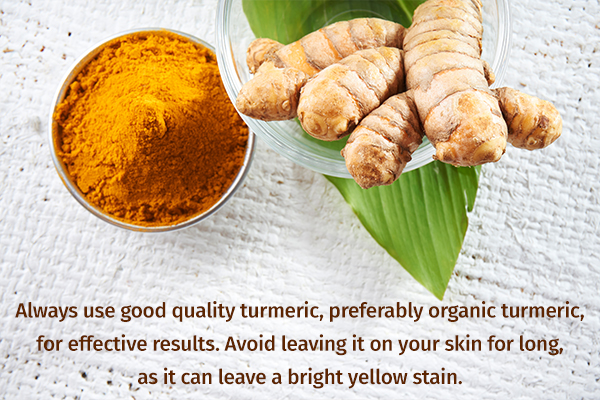
While turmeric is a highly useful natural ingredient, it should be used with the following precautions in mind:
- Conduct a patch test to check for allergic reactions.
- Always use good-quality turmeric, preferably organic turmeric, for effective results.
- Avoid leaving it on your skin for too long, either in powder or paste forms, as it can leave a bright-yellow stain. Similarly, avoid staining other articles.
- Consult your doctor before taking curcumin supplements as curcumin can interfere with the action of some drugs.
- Avoid the oral use of turmeric on an empty stomach as it can cause acid reflux.
Final Word
Turmeric is a natural ingredient loaded with beneficial medicinal and skin care properties. It contains high amounts of iron, fiber, manganese, and vitamins that boost health and improve different medical conditions.
Turmeric has been shown to possess anti-inflammatory, wound-healing, and antioxidant effects in different scientific studies. It can also help in the treatment of eczema, psoriasis, and other skin conditions.
You can include different turmeric-based remedies in your skin care routine to combat different problems and achieve a healthy glow to your skin.
- Was this article helpful?
- YES, THANKS!NOT REALLY


